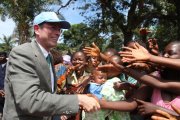 Assistant Secretary-General for Human Rights Ivan Šimonovic greeting residents of Kamako in the Democratic Republic of the Congo. Photo: MONUSCO/Myriam Asmani Assistant Secretary-General for Human Rights Ivan Šimonovic greeting residents of Kamako in the Democratic Republic of the Congo. Photo: MONUSCO/Myriam Asmani
|
 DR Congo: UN official voices concern over human rights situation in east DR Congo: UN official voices concern over human rights situation in east
A senior United Nations official today voiced concern over the human rights situation in the eastern Democratic Republic of the Congo (DRC), which has experienced a recent upsurge in violence.
“The human rights situation in the DRC is of grave concern,” said the Assistant Secretary-General for Human Rights, Ivan Šimonovic, in the capital, Kinshasa, at the end of a nine-day visit to the country. “The activities of armed groups, particularly the Democratic Forces for the Liberation of Rwanda, the Lord’s Resistance Army and Mayi Mayi, constitute a major threat to the civilian population especially in the Kivus.”
Fighting has resumed in eastern DRC in recent weeks between Government forces, dissident groups and militia, causing suffering for civilians who are experiencing displacement, human rights violations, and loss of property. According to the Office of the UN High Commissioner for Human Rights (OHCHR ), the violence has resulted in the displacement of 40,600 people since April this year, with reports of human rights violations.
Mr. Šimonovic said he was “appalled” by the heightened levels of recent violence triggered by defections in the Congolese armed forces, including former members of certain militia groups, and welcomed joint efforts between the peacekeepers of the UN Organization Stabilization Mission in the DR Congo (MONUSCO), humanitarian actors and the authorities to protect civilians and respond to human rights violations.
He noted that in the province of South Kivu, in particular, the joint efforts have led to innovative ways to protect civilians, including the participation of MONUSCO’s civilian components in the planning and monitoring of recent joint military operations.
“Restoring state authority, establishing the rule of law, protecting human rights and building accountable, democratic and professional security forces is a prerequisite for peace, stability and justice,” the human rights official said. “It will require a coordinated and integrated approach to security sector reform with the support of all relevant actors.”
An efficient justice system equipped with adequate resources will help to deter future human rights violations, which is essential in fighting against impunity, Mr. Šimonovic noted, and he encouraged the DRC’s military justice system to keep up its investigation and prosecution of the Bushani and Walikale mass rapes, which occurred in 2010 and 2011.
In addition, the human rights official expressed concern about the plight of Congolese migrants expelled from Angola, numbering about 100,000 in 2011; and noted that he was encouraged to hear from the DRC’s General Prosecutor that investigations into the human rights violations committed in Kinshasa during the 2011 electoral process will be concluded before the upcoming local and provincial elections, creating a conducive environment for the polls.
Related to the DRC, the Office of the UN High Commissioner for Refugees (UNHCR ) today announced that it had ferried hundreds of Congolese refugees back to the northern province of Equateur, at the start of a voluntary repatriation programme from the neighbouring Republic of Congo (ROC).
“We plan to repatriate 246 refugees today from the village of Ikpengbele, near Betou, to the town of Libenge in the DRC. Another convoy is scheduled to leave Ikpengbele for Libenge on Tuesday,” a UNHCR spokesperson, Andrej Mahecic, told a press conference in Geneva today. “We plan to help 81,000 people return home to Equateur province by July next year.”
UNHCR began the operation last Saturday, when a small pilot convoy of boats took 79 refugees from the town of Betou in north-eastern ROC to Dongo on the other side of the Oubangui River in the DRC. On Tuesday, a second convoy took a further 323 refugees from the Eboko site in the ROC across the river to Dongo.
More than 85 per cent of the returnees have been women and children, and they were taken on to their areas of origin in Equateur. Under the repatriation programme, UNHCR hopes to assist 49,000 refugees return this year from the ROC and 32,000 next year.
The returnees on the two convoys were among an estimated 143,000 civilians who fled to neighbouring countries – 123,000 to ROC and 20,000 to the Central African Republic – to escape inter-ethnic clashes sparked by fishing and farming disputes in Equateur in late 2009 between the Enyele and Munzaya communities.
(2012-05-12/UN)
|





 Assistant Secretary-General for Human Rights Ivan Šimonovic greeting residents of Kamako in the Democratic Republic of the Congo. Photo: MONUSCO/Myriam Asmani
Assistant Secretary-General for Human Rights Ivan Šimonovic greeting residents of Kamako in the Democratic Republic of the Congo. Photo: MONUSCO/Myriam Asmani